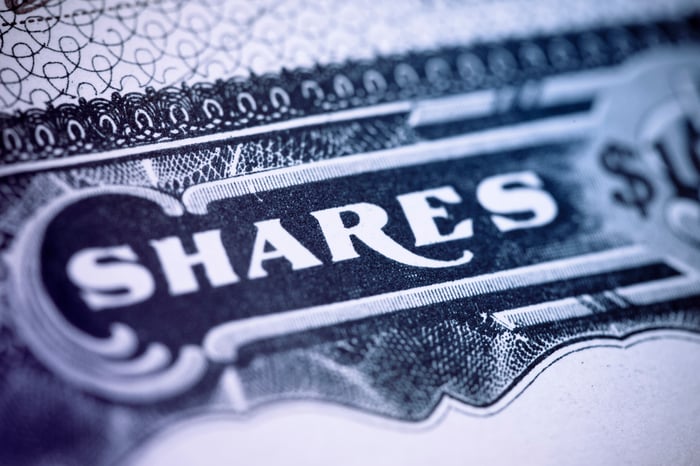One of Wall Street's few constants is that there's always a next-big-thing innovation and/or group of game-changing businesses for investors to flock to. For example, the rise of artificial intelligence (AI) has investors scooping up AI stocks like they're going out of style.
But even before AI became the hottest thing since sliced bread on Wall Street, investors were gravitating to companies conducting stock splits.

Image source: Getty Images.
A stock split is an event that allows publicly traded companies to make superficial changes to their share price and outstanding share count. I call these changes "superficial" because altering a company's share price and share count by the same magnitude has no impact on market cap or operating performance.
Stock splits come in two varieties: forward and reverse. With a forward-stock split, a company is aiming to make its share price more nominally affordable for retail investors. By comparison, a reverse-stock split is designed to increase a company's share price, often with the purpose of ensuring it meets the minimum listing standards on a major stock exchange.
Investors usually focus their attention on high-flying companies enacting forward-stock splits. Since this year began, eight of the nine highest-profile stock-split announcements have been of the forward-split variety.
Over the last two months, I've been aggressively adding to one of these nine high-profile stock-split stocks -- albeit probably not the one you're thinking of.
Wall Street's highest-profile stock-split stocks are on my watchlist, but not in my portfolio
For years, forward-stock splits have acted as a beacon to clue investors into businesses that have been out-executing and out-innovating their competition. In 2024, three of these perennial outperformers have announced and/or completed stock splits.
- Artificial intelligence colossus Nvidia (NVDA -0.36%) announced plans to conduct a 10-for-1 forward split, which became effective following the closing bell on June 7.
- The board of fast-casual restaurant chain Chipotle Mexican Grill (CMG 0.39%) approved a 50-for-1 forward-stock split on March 19, which went into effect earlier this week (after the closing bell on June 25).
- Semiconductor networking solutions specialist Broadcom (AVGO 1.19%) unveiled plans for a 10-for-1 split on June 12, with an effective date of July 15. It marks the first split in Broadcom's history, since being acquired by Avago Technologies in 2016.
This stock-split trio is getting abundant attention on Wall Street -- and for good reason. All three companies have been crushing it on an operating basis.
- Nvidia's H100 graphics processing units (GPUs) have become the standard in AI-accelerated data centers. Demand for Nvidia's AI-GPUs has swamped supply, leading to phenomenal pricing power. Further, most of the "Magnificent Seven" are Nvidia's top customers by net sales.
- Chipotle's management team has stuck to its promise of using locally sourced vegetables (when possible) and responsibly raised meats in its restaurants to court consumers looking for higher-quality food. Additionally, keeping its menu limited helps to expedite food prep and shortens the wait time for customers.
- Broadcom is enjoying a huge uptick in demand for its AI networking solutions, including its Jericho 3 AI fabric, which can connect up to 32,000 GPUs and maximize their compute capacity. Beyond AI, Broadcom is a key supplier of wireless chips and accessories used in next-generation smartphones.
While all three of these high-flying stock-split stocks (for better or worse) have a place on my watchlist, they won't be found in my 42-stock investment portfolio. Rather, the stock-split stock I've more than quadrupled my stake in over the last two months is the only high-profile business to notify its shareholders of a coming reverse split.

Image source: Getty Images.
Say hello to the reverse stock-split stock I can't stop buying
Reverse-stock splits often have negative connotations. That's because the companies conducting them have usually seen their share price plunge. But this isn't always the case, as evidenced by the $11 billion market cap company I've been piling into: Sirius XM Holdings (SIRI 3.66%).
In December 2023, Liberty Media announced that its Sirius XM tracking stock, Liberty Sirius XM Group (LSXMA 2.83%) (LSXMB 1.35%) (LSXMK 3.02%) would be merged with Sirius XM Holdings to create a new public company ("New Sirius XM") with a single outstanding share class. Having the Liberty Sirius XM Group tracking stock as the primary owner of Sirius XM's outstanding shares has, admittedly, been confusing for years. Combining the two, which should occur during the third quarter, will end the confusion and any unexplained arbitrage between the securities.
But as things now stand, Sirius XM Holdings has approximately 3.85 billion shares outstanding. Some mutual funds and institutional investors simply won't purchase stocks with a share price below $5 because they're deemed too risky.
A June 17 8-K filing from Sirius XM notes that amendments have made to this merger agreement that'll result in a 1-for-10 reverse split upon closure. This should increase the new company's share price to nearly $30 (based on the June 21 close), and will likely entice new institutional investors and mutual funds to take the plunge.
But let's be clear: I haven't more than quadrupled my stake in Sirius XM because of any stock split. I've done so because of the company's clear-cut competitive advantages and historically cheap valuation.
Sirius XM is the only licensed satellite-radio operator, and that comes with its own unique advantages. Although it's still competing for listeners with terrestrial and online radio operators, being the only satellite-radio operator affords the company reasonably strong subscription pricing power.
I'll also add that some aspects of Sirius XM's cost structure are highly transparent and predictable. While revenue share, royalties, and content costs are going to vary from one quarter to the next, transmission expenses and equipment costs tend to be relatively fixed no matter how many subscribers the company has. The predictability of its cost structure often leads to consistent operating cash flow year after year. This is why Sirius XM can comfortably afford to dole out more than $400 million annually in dividends to its shareholders.
Another critical difference between Sirius XM and traditional radio operators is how the former generates revenue. Whereas terrestrial and online radio providers rely heavily on advertising, Sirius XM has historically brought in less than 20% of its net sales from ads. The bulk of its revenue comes from subscriptions.
While businesses are quick to reduce their ad spending during economic downturns, consumers are less likely to cancel their satellite-radio subscription. In short, Sirius XM is better-positioned to deal with economic turbulence than its peers.
The final piece of the puzzle is its valuation. As of the closing bell on June 21, Sirius XM was trading at 9 times forward-year earnings and less than 6 times forecast cash flow per share in 2024 and 2025. This represents a greater-than 50% discount to its average forward-year earnings multiple over the last five years, and over a 40% discount to its average cash flow multiple for the last half-decade.
With a dividend yield of nearly 4% in tow, Sirius XM is the stock-split stock I can't stop buying.




